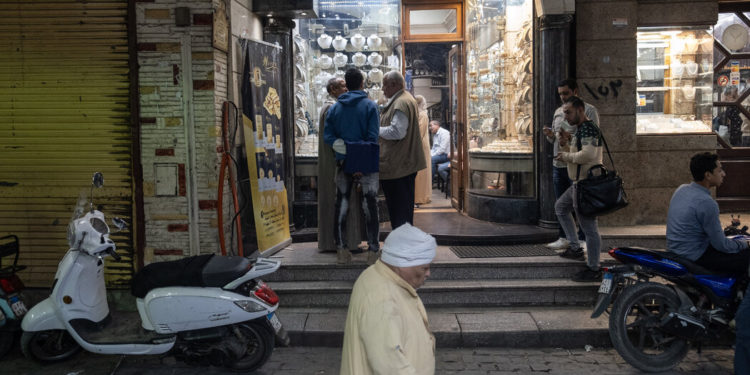By THE NEW YORK TIMES
Inside the wood-paneled shop in Cairo’s famed Khan el-Khalili market, the price of gold was slumping fast, and Rania Hussein was feeling the future slip through her fingers.
She and her mother watched the gold merchant weigh the necklace and three bangles they had brought in — jewelry Ms. Hussein had bought for her mother as a present five years ago but which they now needed to sell. Her brother was getting married, an expensive undertaking even in normal times, but the economic crisis and soaring inflation that have gripped Egypt for more than two years left the family no choice.
Years of reckless spending and economic mismanagement had come to a head in 2022, when Russia’s invasion of Ukraine helped plunge Egypt into a financial crisis. The war in Gaza has only deepened the pain.
The crisis has jacked up the price of the price of eggs at the grocery store as well as the new furniture her brother is required, by tradition, to buy for the marital home, Ms. Hussein said. It also has shut her clothing design business and wiped out three-quarters of the value of her brother’s salary as an accountant.
And, in an odd side effect, it upended Khan el-Khalili’s normally placid gold jewelry and bullion stores, with their old-fashioned curly lettered signage and the Quranic recitations drifting ceaselessly from dusty speakers. In the past two years, speculators buying gold descended on the market as a crashing Egyptian currency drove up demand for gold as a safe haven from the turmoil.
While the price of the metal has generally risen despite the occasional reverse, its value has ebbed and flowed along with demand, depending on the vagaries of daily economic news, a volatility that has baffled both consumers and merchants.
On the day Ms. Hussein visited the market, the price of gold was dropping fast, on news that Egypt might have found a lifeline to save it from what had, until then, looked like looming financial ruin. The country late last month struck a $35 billion deal for the United Arab Emirates to develop a new city and tourism destination on Egypt’s Mediterranean coast.
Within hours of the deal’s announcement, Egypt’s pound strengthened, the dollar’s black-market value fell and gold prices dropped with it.
If the Emirati funds materialize as promised, analysts say, the cash, along with a new bailout agreement with the International Monetary Fund expected within weeks, will help Egypt stabilize its economy. It will help the country avoid a debt default, pay for a backlog of needed imports and undercut the black market in dollars created by a shortage of foreign currency.
But for Egyptians, the damage has been done.
As they watched the value of their paychecks and savings evaporate over the past two years, the poor skimped on food, the middle class pulled their children out of good schools for cheaper or free ones, and even the better-off went without vacations and meals out. Millions of people descended into poverty.
“It’s not guaranteed that it’ll go up, and I’m afraid that it’ll go down again,” Ms. Hussein said of the falling price of gold as she sat in the market shop, explaining why she had decided to sell. “And the price of furniture should go down, but we have yet to see it.”
She sighed, adding, “Everything is a joke.”
The turbulence has turned many people into reluctant speculators, their lives ruled by uncertainty and rumors. Checking the black-market price of the dollar has become as commonplace as checking the weather forecast.
On paper, Ms. Hussein would collect more for the jewelry than what she had paid for it five years ago, but two years of rampant inflation and a sliding pound would probably cancel any gains. The price of many goods is now set by the black-market value of the dollar, which rose to around 70 pounds to the dollar last month, compared with about 16 before the crisis. “Even vegetable sellers are worried about the dollar price,” said Ms. Hussein’s mother, Tamrihan Abdelhadi. “Everybody is pricing in dollars.”
The family had already sold one of Ms. Abdelhadi’s gold rings to afford the three new rings a groom’s family traditionally gives an Egyptian bride, and still there was the couple’s apartment to think about.
“It’s so expensive, the living room set for example,” Ms. Hussein said. “This isn’t going to be enough for that, but it’ll go into the fund.”
Since early 2022, a crippling dearth of foreign currency triggered by Russia’s invasion of Ukraine and Egypt’s heavy debt load has sent inflation to record highs and the value of the local currency plummeting to record lows.
The war in Gaza has deepened the crisis, threatening tourism, a key source of foreign currency, and halving Egypt’s dollar revenue from the Suez Canal as the Iran-backed Houthi militia has attacked ships in the Red Sea.
Egypt imports oil, wheat and many other goods that it must pay for in dollars. That has made the United States currency both indispensable and scarce, creating a murky black market in which the dollar’s value far outpaces the exchange rate artificially set by the government of about 31 pounds to the dollar.
Looking for safe financial harbors, Egyptians with savings began plowing them into gold, real estate and cars — anything they thought would hold its value better than the foundering Egyptian pound.
Traditionally, Egyptians have bought gold jewelry as a long-term saving strategy, but speculators have now turned to coins and ingots to try to turn a quick profit, said Saeed Imbaby, the founder of iSagha, a gold trading platform.
Demand for gold doubled and then some, driving up the price. The market grew so fevered that the government announced in November that it was partnering with a financial technology company to install A.T.M.s that would dispense gold bars instead of cash.
Before the pound’s value began slipping, “I never thought about gold, not even jewelry,” said Nermin Nizar, 52, a translator in Cairo. But “in this panic, I needed anything I could get to protect the value of my money.”
She put her savings into a single gold coin in September. Its value in pounds has risen 30 percent, though inflation would slash the buying power of the profit if she sold now.
The speculation wreaked havoc in the Khan el-Khalili gold market as shop owners confronted an ever-fluctuating price for the raw material they bought to turn into rings, necklaces and earrings. Many stopped selling altogether.
“I can’t work, because I don’t have a stable price to sell at,” said Amir Salah, the owner of a small gold jewelry store. “I don’t even understand that much of what’s going on.”
Now a new uncertainty is gripping the market, though one tinged with optimism. The Emirates, a longtime political ally and financial patron of Egypt’s president, Abdel Fattah el-Sisi, has already begun transferring billions of dollars to Egypt for the development deal, Mr. el-Sisi said on Wednesday. The president, who until the war in Gaza began had been hemorrhaging popular support, appears to have won a reprieve.
“It’s reassuring,” said Nasser Badawi, the proprietor of the Bullion Trading Center in Khan el-Khalili, which sells tiny solid-gold lollipops and baby bottles as gifts for newborns, along with regular ingots that he said had become popular investments last year. “Anything that brings me funds and helps me get through this crisis, why not?”
Preventing the economy of the Middle East’s most populous country from collapsing has likewise taken on new urgency for Egypt’s Western partners amid the war in Gaza. The I.M.F. has announced that it will increase a previously agreed loan of $3 billion within weeks, with the amount expected to total about $8 billion, according to five diplomats in Cairo who were briefed on the talks.
But few details about the Emirates deal were available. The funds would stave off default, analysts said, but Egypt risked another crisis if it did not make meaningful reforms to cut spending, attract more private investment, produce more exports and reduce the military’s dominance over the economy.
Before the deal, growing economic pressure had forced the government to make some changes, including freezing some costly megaprojects ordered up by Mr. el-Sisi that had piled on the debt, among them a showy new capital in the desert.
But Egypt now has less incentive to change course.
The deal is “a game-changer,” said Tarek Tawfik, the chairman of the Cairo Poultry Group and president of Egypt’s American Chamber of Commerce. “The question is, how will the money be used?”







Discussion about this post